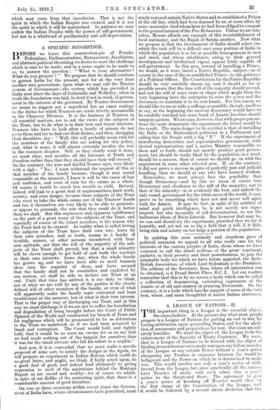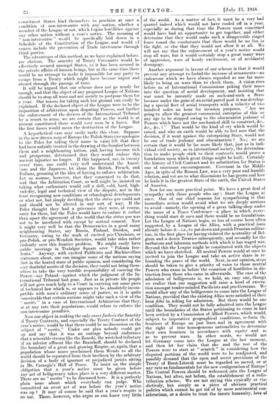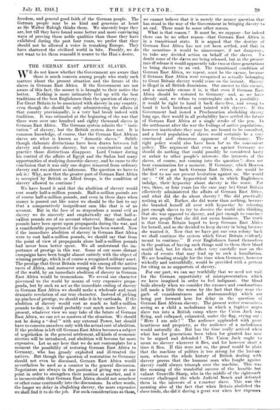A LEAGUE OF- NATIONS.—II. T HE important. thing in a League
is the essential object, the casia foederis. At the present day what most people propose is a League of Nations for putting an end to war, for forcing arbitration upon quarrelling States, and for the aboli- tion of armaments and preparations for war. Our aims are infi- nitely humbler. We want the object of the League to be the enforcement of the Sanctity of Treaty Contracts. We want, that is, a League of Nations to be formed with the object of binding its members never to make war upon any fellow-member of the League or any outside Power without a year's notice abrogating any Treaties hi existence between the would-be belligerent and the Power on which he is determined to make war. This would involve not only a year's notice of with- drawal from the League, but, since practically all the nations have Treaties of amity with each other, also a year's notice to the threatened State. The agreement to gii e a year's notice of breaking off Treaties would thus le the first clause of the Constitution of the League, and it would be followed by a second clause declaring that the constituent States bind themselves to proclaim at once a ondition of non-intercourse with any nation, whether a member of the League or not, which legins hostilities against any other nation without a year's notice. The meaning of " non-intercourse " would be specifically laid_ down in a Schedule of the Constitution of the League, and would. c,f course include the prevention of Trade intercourse through third parties. The advantages of this method, as we have explained before, are obvious. The sanctity of Treaty Covenants would be effectively secured amongst States, as it has been secured in the private affairs of human beings, but at the same time there would be no attempt to make it impossible for any party to escape from a Treaty which might have become unjust and absurd through the passage of time.
It will be argued that our scheme does not go nearly far enough, and that the object of any proposed League of Nations should be to stop all wars and not merely to postpone them for a year. Our reason for taking such low ground can easily be explained. If the declared object of the League were to be the imposition of arbitration upon disputing Powers, and further the enforcement of the decrees of the International Tribunal by a resort to arms, we are certain that as the world is at present constituted there would very soon be a fiasco. But the first fiasco would mean the destruction of the League.
A hypothetical case may easily make this clear. Suppose in the new-drawn map of Europe the Polish State (we apologize to the Poles for taking their name in vain) felt that they had been unfairly treated in the drawing of the frontier between them and a neighbouring nation, and, having become rich and prosperous, determined that they would endure this ancient injustice no longer. If this happened, say, in twenty years' time, one could very well understand the Ameri- cans and the Japanese, let alone the British, French, and Italians; groanina° at the idea of having to enforce arbitration. Let us assume, however, that they consented to do that, and that the Arbitration Court, as well might be, insisted on taking what enthusiasts would call a dull, cold, hard, high- and-dry, legal and technical view of the dispute, not in the least recognizing new conditions or ethnological developments or what not, but simply deciding that the status quo could not and should not be altered in any sort of way. If the Poles thought they had a grievance they were, of course, sorry for them, but the Poles would have to endure it rather than upset the agreement of the world that the status quo was not to be interfered with except by mutual consent. Now it might very well be that the Democracies in a good many neighbouring States, say Russia, Finland, Sweden, and Germany, owing to the work of excited pro-Ukrainian, or pro-Polish, or pro-Wendish Societies, would take sides rather violently over this frontier problem. We might easily have public meetings in Trafalgar Square over " Polonia Irre- lenta." Anyway, with excited Publicists and Machiavellian statesmen about, one can imagine some of the nations saying that in the heated state of public opinion, and considering the very doubtful merits of the decision, they could not bring them- selves to take the very terrible responsibility of coercing the Power—say Poland—against which the judgment of the In- ternational Tribunal had gone. Just as in private life people will not give much help to a Court in carrying out some piece of technical law which is, or appears to be, absolutely incom- patible with men's ordinary sense of justice, so it is quite conceivable that certain nations might take such a view of the merits " in a case of International Arbitration that they, or at any rate their populations, would refuse to enforce the non-intercourse penalties.
Now our object in making the only cases foederis the Sanctity A Treaty Contracts, and especially the Treaty Contract of the year's notice, would be that there could be no discussion on the subject of " merits." Under our plan nobody could get up and say that it was an outrage beyond endurance that a miserable stream like the Zamski, the wretched tributary of an inferior affluent like the Bramboff, should be declared the boundary of a great and growing Empire, or, again, that a population whose noses proclaimed them Wends to all the world should be separated from their brethren by the arbitrary decision of a body of ignorant or prejudiced jurists sitting in Mr. Carnegie's Hall of Peace. To insist on the simple obligation that a year's notice must be given before any act of belligerency takes place is a very different matter. There are no " merits to be discussed here. It is a perfectly plain issue about which everybody can judge. Who committed an overt act of war before the year's notice was up ? It may of course be said that a year's respite is no use. Those. however, who argue so can know very little of the world. As a matter of fact, it must be a very bad quarrel indeed which would not have cooled off in a year, especially as during that time the . Powers most Concerned would hate had an opportunity to get together, and either determine that they would make such a disagreeable ringed fence round the combatants that there would be no fun in the fight, or else that they would not allow it at all. We W ill not say that -the enforcement of a year's notice would stop all wars, but it would certainly stop a great many wars of aggression, wars of heady excitement, or of accidental demagogy.
Another argument in favour of our scheme is that it would prevent any attempt to forbid the increase of armaments—an endeavour which we have always regarded as one far more likely to bring on wars than to check them. A vision rises before us of International Commissions poking their noses into the question of aerial development, and insisting that war must be instantly made on such-and-such a State because under the guise of an aerial parcel post it was develop- ing a special fleet of aerial transports with a velocity of two hundred miles an hour for invasion purposes. " Are we going to allow the greatest commercial enterprise of this or any age to be stopped owing to the obscurantist jealousy of Powers which have not the mechanical skill to construct, &c., &c., &c. ? " That would be the kind of cry which would b.,: raised, and who on earth would be able to feel sure that the decision, if it went against the enterprising State, would not be one of trade jealousy and obscurantism ? No ; we are certain that it would be far more likely that, just as in indi- vidual civil society, so in international society, the determina- tion to make people stick to their contracts would prove a foundation upon which great things might be built. Certainly the history of Civil Contract and its substitution for Status is one of enormous encouragement. Covenant in the Middle Ages, in spite of the Roman Law, was a very poor and humble relation, and yet see to what dimensions he has grown and how he lords it in the greatest State of the earth, the United. States of America.
Now for one more practical point. We have a great deal of sympathy with those people who say : Start the League at once. One of our chief reasons for sympathizing is that immediate action would avoid what we are deeply anxious to avoid—namely, the opening of a great talking-shop under the name of a Peace Conference—a place in which every- thing would start de novo and there would be no foundations. Let the League of Nations begin, as has of course been often suggested, by a League of the Allies, with a practical issue already before it—i.e., to put down and punish Prussian militar- ism, in the first place for having violated the neutrality of Bel- gium and a dozen Treaties subsequently, and secondly for the barbarous and inhuman methods with which it has waged war. Beyond this the League might be constituted with the objects which we have sketched. All neutral Powers would at once be invited to join the League and take an active share in re- founding the peace of the world. Next, in our opinion, steps should be taken to give a priority of voice to those neutral Powers who came in before the cessation of hostilities in dis- tinction from those who came in afterwards. The case of the admission of belligerents is, we hold, an easy one, though we realize that our suggestion will raise a howl of execra- tion amongst tender-minded Pacificists and pro-Germans. We would allow any of the belligerents to come into the League of Nations, provided that the existing Allies were satisfied of their bona fides in asking for admission. But there would be one condition. They would not be fully admitted into the League until the boundaries of the States petitioning to come in had been settled by a Commission of Allied Powers, which would; subject to imperative geographical conditions, re-form the frontiers of Europe on just lines, and -in agreement with the right of true homogeneous nationalities to determine their own frontiers in accordance with equity and so as to prevent wars. In other words, we would not let Germany come into the League at the last moment, and then let her claim that she and the rest of the Powers were to start at " scratch " in considering how the disputed portions of the world were to be readjusted, and possibly demand that the open and secret provisions of the Treaty of Brest-Litovsk must be regarded as sacred, or at any rate as fundamentals for the new configuration of Europe ! The Central Powers should be welcomed into the League of Nations, but after, not before, the establishment of a redis- tribution scheme. We are not saying this cynically or vin- dictively, but simply as a piece of obvious practical politics which cannot be got rid of by mere sentimental con- siderations, or a desire to trust the innate humanity, love of freedom, and general good faith of the German people. The Getman people may be as kind and generous at heart as Sir Walter Raleigh thinks them. We sincerely hope they are, but till they have found some better and more convincing ways of proving these noble qualities than those they have exhibited during the past four years, we prefer that they should not be allowed a voice in remaking Europe. They have shattered the civilized world in bits. Frankly, we do not want to let them remould it nearer to the Hun's desire.




























 Previous page
Previous page